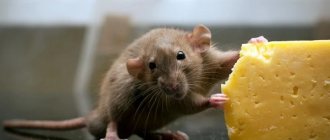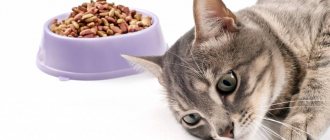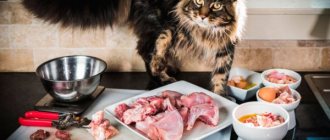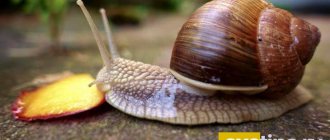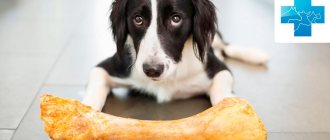Foods that should not be given to rats
If your pet's health is important to you, do not feed it from the table. It seems that there is nothing wrong with giving a rodent a piece of apple, chicken or cracker, but this is not so. The rat may refuse its food and instead receive a high proportion of fat and carbohydrates. It will be difficult to wean an animal accustomed to a common table, which means the end of a balanced diet.
It is strictly forbidden to give your rodent alcohol, fried, smoked, salted, pickled, fatty foods, carbonated drinks and sweets.
Wrong mixtures
Some people give their rats hamster food, but this is not the best option. The fact is that it contains too many sunflower seeds and peanuts, which cause health problems.
There are many alternative foods, particularly hazelnuts. This is a good source of protein and a great way for your rat to exercise his jaws.
The rat is entirely dependent on you for food. By providing her with proper nutrition, you will get a healthy pet.
Special food for rats will give your pet all the substances it needs.
However, he won’t refuse a small treat either.
Grain and cereals
Grains are the main product in the diet of rats, but they are not equally important. Wheat is a rich, high-calorie product; it can be given to rats, but it must be taken into account that it must be supplemented with other components. The mixture may include oats, buckwheat, corn, rye, barley or pearl barley, rice, millet or millet. These grains are not equal. Buckwheat is a dietary low-calorie product, and corn, on the contrary. Oats should be added in small quantities; excess may cause fermentation. Refined rice is low in nutrition, so it's worth finding a wild rice blend or an unrefined version of the grain.
Semolina does not contain anything useful, so this product should be excluded from the diet. Barley or wheat cereals are suitable for porridges. Porridge is useful only for weakened, emaciated animals or young animals. Adult rats should only give them as a treat.
What do rodents like?
Biologists and professional deratizers (pest extermination specialists) agree that mice are more often “led” to delicacies of plant origin, while rats love animal products. But when a rodent has been hungry for a long time, it will eat whatever it finds. That is why at first it is difficult to determine who is in the house. In view of what has been described, employees of non-food industry enterprises resort to a trick - they use poisoned grain to destroy parasites. It’s cheap and works 100%, because pests have no other food.
Mice
Based on the above, the best mouse baits are:
- fresh baked goods - a fragrant wheat bun, muffin, gingerbread or a piece of soft white bread will attract the pest almost instantly;
- seeds - in the wild, mice eat grains and willingly feast on them in our homes;
- nut – as appetizing as grains;
- a slice of apple, pear, plum or peach - familiar fruits with a bright smell often become food for mice in the wild;
- peanut butter - nut paste has a pronounced aroma and smells fragrant for many meters.
Rats
Rats are practically omnivorous. They can be caught using any delicacy, but we recommend:
- lard is a product with a bright, spicy aroma that attracts rodents like a magnet;
- sausage - only high-quality sausage products will do; rats often refuse cheap ones, stuffed with chemicals;
- fresh meat - the specific smell that various parts of a chicken or pig carcass emit attracts pests;
- minced meat is an almost ideal bait for rats, better with the addition of onions;
- smoked fish is a very flavorful option that can catch the maximum number of rodents;
- vegetable oil – “fragrant” unrefined sunflower oil can be used in combination with a piece of bread.
Vegetables and greens
Among vegetables, foods that cause fermentation are prohibited: white and red cabbage, Savoy and Brussels sprouts, as well as cauliflower. Rats can eat broccoli in small quantities. Strong gas formation is caused by radishes, turnips and radishes, as well as all types of legumes: beans, peas, beans and lentils
.
You should be careful when giving sweet peppers; some animals have the same reaction to it. You can sometimes offer boiled green beans if they do not cause gas in your pet. Carrots, zucchini, zucchini and pumpkin are delicious and healthy foods. Cucumbers in excess will cause diarrhea
.
Eggplants are only good when cooked; solanine in raw vegetables can cause poisoning. Artichokes can also only be given cooked. Potatoes will not bring any benefit to the animal
. In its raw form it is contraindicated for animals, but when cooked it acts as ballast. However, some rodents enjoy eating potatoes.
Vegetables, fruits and herbs should be given daily in small quantities - 10-12 g.
Dill, cilantro, parsley, basil and celery are healthy foods for animals and can be given every day. They are not only safe, but also help digest protein foods. Onions, garlic and wild garlic are not suitable due to phytoncides that irritate the gastrointestinal mucosa.
They should be given occasionally and in limited quantities. Acidic vegetables such as tomatoes, rhubarb and sorrel can also eat away at the delicate walls of a rodent's stomach. You should not give animals spinach either. Beets carry another danger - a laxative effect, they should be given carefully. Leaf lettuces that do not have a specific bitterness are generally suitable for animals.
Inside. My rat has run out of food. What can replace it? Do not offer bread.
It's already night for us.
And the rats are rebelling and want to eat. Basic principles of proper nutrition for rats:
Food should always be fresh. It should not contain products harmful to rats (see list below) It should contain all the vitamins, minerals and other trace elements that the rat needs. Food should be given to an adult rat 1-2 times a day (provided there is dry food in the cage), and to a baby rat 2-4 times a day.
Products that can be given to the average rat without taking into account physical condition and personal characteristics:
Fruits: apples pears bananas (antibiotic properties) citrus fruits (uncommon, cause allergies!) plums (antibiotic properties), (antiviral properties) peaches apricots dates grapes persimmons cherries cherries... Berries: raspberries (antibiotic properties) blueberries strawberries (antiviral properties) strawberries currants cranberries (antiviral properties) Vegetables: potatoes (boiled!) cabbage (raw and boiled) - white, broccoli (antitumor properties), cauliflower tomatoes cucumbers (raw) radishes carrots pumpkin melon watermelon onion (antibiotic properties), (antiviral properties) garlic (antibiotic properties), (anti-arthritic properties) eggplant (antibiotic properties) Herbs: dill parsley celery cilantro radish greens.
Meat: boiled meat (any) fish, seafood, meat baby food, bones (unfried). Protein foods: yogurt (without filler, not very fatty), cottage cheese, kefir, baby food. Grain: corn oats wheat millet flax grains pumpkin and sunflower seeds (not fried, not salted), barley oat flakes Dry food: dry pasta nuts dried dandelion and nettle greens. Other: boiled pasta, porridge, low-fat broth, bread, crackers, boiled rice, ready-made food. Vitamin supplements: special fish oil drops. vitamins for rodents Mineral supplements: chalk mineral stones for rodents
Fried Fatty Salted Spoiled foods Chocolate and products containing it Carbonated and alcoholic drinks Raw: potatoes, beans, red and Brussels sprouts, artichokes, tofu (bean curd) Sprouted potatoes and eyes Green bananas Spinach
beets rhubarb almonds
Meat (not fatty) rice, buckwheat (steamed) In general, there is a zoo at every turn.
Source
Fruits
All citrus fruits should be immediately excluded from the diet of rats due to acidity.
. Occasionally you can give a piece of sweet tangerine. Forest and garden berries must be sorted according to their acid level. Thus, cranberries, which are useful in many respects, should be given with caution because of their taste.
Sweet cherries are more suitable than sour cherries. Never give animals seeds from fruit trees or citrus fruits.
They can be poisonous to rodents. You should pay attention to the special properties of fruits. Chokeberry and bird cherry strengthen, and plum weakens. This must be taken into account when choosing food. Pear can cause fermentation in some individuals. Watermelons and melons can be given in small quantities and only in season, as they accumulate nitrates.
Dried fruits are too sweet and may cause fermentation. They should be given carefully, as a treat.
Tomatoes
Can rats eat tomatoes? The answer to this question is also positive. But these vegetables should only be given when ripe and in small quantities, since they contain acids. Unripe fruits contain solanine, just like leaves and tops, so they should not be fed. Pickled and canned tomatoes are also contraindicated for pets. If you do not grow your own vegetables, then tomatoes can only be given to rats during the season.
Pepper
Bell pepper contains many vitamins. Therefore, rats can have pepper, but only once a day, if your pet is not prone to increased gas production.
Eggplant
Inexperienced breeders are often interested in whether rats can eat eggplants. Before feeding this vegetable to your pet, it is necessary to wash it well, peel it and heat it. Leaves and tops should not be fed to a rodent because of the solanine they contain.
Cabbage
But can rats eat cabbage? Red, white, and Brussels sprouts should not be given to pets, since this vegetable increases gas formation in rats. Broccoli and cauliflower can be eaten in small quantities and only for individuals who are not prone to increased gas formation.
Carrot
Rats can eat carrots raw. Just do not overfeed your pet with this vegetable to prevent intestinal upset. Also, overeating carrots can cause allergies and hypervitaminosis, which in turn leads to eye problems.
Zucchini
Can rats eat zucchini? Zucchini and zucchini can be given raw, boiled or steamed.
Potato
Can rats have potatoes and in what form can they be given to them? Raw potatoes should not be fed to your pet due to their high starch content. Offer your rodent a small piece of boiled potato, but no more than a couple of times a week. It is also prohibited to feed potato tops, sprouts and green tubers to rats, as they contain poisonous solanine. Do not give your pet chips, even as a treat.
Corn
Corn can be offered to rats raw or cooked, only in small quantities as a treat. Canned corn should not be fed to pets. You can also offer your pet popcorn as a treat, only if you made it yourself, without salt, sugar or spices.
Beet
Can a rat eat beets? It is possible, but not often and in small quantities, since this vegetable has a laxative effect. You can give beets raw or boiled.
Radish
Can rats have radishes? Radishes and turnips increase gas production, so they should not be fed to rats. Although there are messages on forums about feeding pets with these products. But we do not recommend doing this. Do not give your pet foods that may cause him discomfort.
Pumpkin
Pumpkin is a very healthy vegetable because it contains fiber, proteins, vitamins and other beneficial substances. Therefore, to the question: can rats eat pumpkin, there is one answer - yes, they can. Pumpkin is fed to rodents raw and boiled. You can also offer your pet pumpkin seeds, they are healthier than sunflower seeds. In addition, they are an excellent prophylaxis against helminths. But you also shouldn’t overdo it with them, since they are fatty. A rat can be given no more than 10 pieces. in Week.
Onion and garlic
Onions and garlic are very spicy for rats and your pet may refuse to eat them, but a rodent may like young green onions. Onions and garlic are most often offered as an antibiotic and antiviral agent for diseases, only in small quantities.
Peas
Peas increase gas formation, so it is not advisable to feed them to rats. You should also not feed your pets canned green peas. But you can occasionally offer your pet some fresh green peas, either from the pod or boiled.
Beans
Rats should not eat raw beans and other legumes, as they increase gas formation. But there is an opinion that sometimes legumes can be offered to rodents only after heat treatment.
Rats can diversify their diet with various vegetables, both raw, boiled and steamed. Boiled ones, in turn, can be offered to your pet in the form of small pieces or puree. But most importantly, try not to give vegetables that could harm your pet or cause discomfort. These vegetables can be very healthy with a huge amount of vitamins. But if they can make a rat feel bad, then why experiment on the animal and try to feed it with foods that are not recommended to be fed to these rodents.
Love your pets, follow the rules of care and feed them correctly. Now you know what vegetables a rat can eat, and which ones your pet should refrain from eating.
Did you like the article? Share with friends: [supsystic-social-sharing id=”1"]
- Related Posts
- Rat breeding
- How rats laugh and why they do it
- Pregnancy in rats
« Previous entry
Dairy
The decorative rat eats dairy products with pleasure, but some animals have lactose intolerance. Regular milk should not be given to a rodent at all, but fermented milk in small quantities will not harm. However, you should not feed your pet rat sour cream, cheese or cream due to the high fat content of these products.
Animals benefit from cottage cheese, fermented baked milk, yogurt without additives and sugar, yogurt, kefir, acidophilus. All these products should have a fat content of 2-4%. Low-fat foods are less natural. “Sour milk” should be chosen with a short shelf life, preferably children’s milk or from farms.
Animal proteins
Twice, or even three times a week, animals are supposed to receive animal proteins. The following can be served at the table:
- boiled lean meat;
- hard-boiled chicken or quail eggs;
- mealworm, zoophobus (zophobas), gammarus;
- seafood;
- high quality cat or dog dry food.
From poultry, you can give chicken breast, but it is better to feed turkey, which is not fed with growth hormones. From ungulates you can take beef, lean lamb, and game. It is better to grind the boiled yolk with water so that the rat does not choke. You should not feed fatty pork and its derivatives to rats.
Store-bought beef should be soaked for 2-3 hours before cooking, and chicken should be boiled in several waters to remove harmful substances. Rats can suffer from allergies.
Meat
Meat and fish are recognized as the main sources of protein. It is also very important to introduce hearts, kidneys, liver and tubular bones of birds into the diet of a domestic rat. Feed your pet only meat and fish that are not too fatty. The best feeding option is pre-boiled meat, cut into small pieces. Never give your animal high-temperature food; wait until the meat cools down. It is worth noting that frozen meat is not suitable for feeding rats. An excellent addition to a healthy rat diet would be low-fat broth without various spices and additives.

